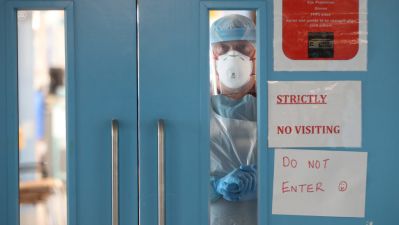Updated at 17:16
A member of the National Public Health Emergency (Nphet) says the high transmissibility of the Delta variant means basic public health measures will now have less impact than they had at the start of the pandemic.
Director of the National Virus Reference Laboratory at UCD, Dr Cillian De Gascun said the most vulnerable in society still need to be protected.
“From a personal perspective, I don’t know what’s going to happen over the next couple of weeks.
"Nphet will meet again this week, and Government continues to keep up-to-date with the figures," he said.
We obviously don’t want to go back to lockdown because we know that there are very negative outcomes associated with that.
Advertisement
"But at the same time, we need to protect our health service, we need to protect society and we need to save as many lives as we can," he told Newstalk.
It comes as a further 5,959 cases of Covid-19 have been confirmed in the Republic, as the head of the HSE said the health service is “taking all mitigating actions” to help the country cope with a surge in infections.
Paul Reid, in a tweet on Saturday morning, said: “We’re surging across the whole health system and taking all mitigating actions.
“We value and appreciate everyone’s support.”
Mr Reid, chief executive of the HSE, said there are currently 640 patients in hospital with Covid-19.
As of Saturday morning, 121 people are in intensive care.
Some #COVID19 updates. 200,500 lab tests done in the past 7 days. 550,000 boosters & 3rd doses administered so far. 640 hospital patients, 118 in ICU. We're surging across the whole health system & taking all mitigating actions. We value & appreciate everyone's support. @HSELive
Advertisement— Paul Reid (@paulreiddublin) November 20, 2021
A booster programme is currently being rolled out by the HSE, with 550,000 jabs administered so far.
Health officials have in recent days expressed concern about the potential for a further rise in Covid-19 cases and the crippling effect it could have on the fragile health system.
Some hospitals already foresee the cancellation of elective treatments in the coming days as pressure builds.
Deputy chief medical officer Dr Ronan Glynn, in a video posted on Twitter on Friday, said it was possible Ireland could record 200,000 cases of Covid in December.
“The next few weeks will be difficult for everybody,” he predicted.
Earlier this week, the Government introduced a set of fresh measures it hopes will slow the spread of Covid-19.
This includes ordering that pubs, nightclubs and restaurants should now have a midnight closing time while people are also being asked to work from home if possible.

It will take several days for health officials to be able to say if the new measures are having the desired effect and if Ireland can avoid the return of tougher restrictions, which have not been ruled out by Taoiseach Micheal Martin.
On Friday night, chief medical officer Dr Tony Holohan said: “Anyone who is going to get Covid-19 in December has not yet been infected.
“Their infection is not inevitable and there is still time to prevent it by small changes in our behaviour.”







